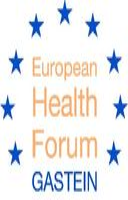
Contact:
Mag. Julia Kent
Phone: +43 1 890 04 29-0
E-Mail: julia.kent@minc.at
- EU
- medicines
- Health
- EHFG
| Pressbox |
Bad Hofgastein (pts021/02.10.2015/15:00) - At this year's European Health Forum Gastein (EHFG), several discussions focused on the increasing demands for new strategies to ensure equal access to high quality healthcare. The funding and pricing of medicines as well as universal access to healthcare were also addressed, as was the role of the EU in this area.
Spiralling healthcare costs and the sometimes exorbitant cost of new high quality medicines not only fuel the fears of EU citizens of the approach of a two-tier health system but are also issues of great concern to doctors and statutory health insurance organisations. New concepts need to be developed at international and transnational level to ensure equal access to high quality healthcare in the long term.
On the last day of the European Health Forum Gastein the European Commissions DG Health and Food Safety (DG Sante) held an event on "Access to high-quality healthcare and innovative treatment". Key note speaker was Vytenis Andriukaitis (EU Commissioner for Health and Food Safety): "Last year the Commission proposed an agenda to support Member States in improving their health systems. Within this agenda, accessibility was identified as one of the three main pillars of health systems, together with effectiveness and resilience. It is time to have transparent open discussions including all stakeholders to build up sustainable systems", the Commissioner explained. On access to innovative medicines he said that "there is an increasing interest among Member States to reflect jointly on how to increase patient access to innovative medicines."
Higher patient expectations
In response to increasing patient mobility, higher expectations with regard to healthcare and the pace of new developments in healthcare technology, there is a trend within the EU towards cooperation among national healthcare systems and coordination of healthcare policy.
New strategies aimed at fair pricing need to be developed, on the one hand to ensure equal access to new medicines and on the other hand to ensure the financial viability of healthcare systems. The need for efficient, needs-oriented deployment of qualified medical personnel and increased willingness among patients to undergo treatment abroad need to be taken into account in the development of new concepts aimed at securing healthcare systems.
New cancer treatments - a chance for patients
The development of new forms of treatment and medicines is of course to be welcomed as a positive development - yet it also represents a challenge for national health authorities. They are the ones left to decide if the cost of such products justifies their therapeutic effect. This is often the case with medication used in cancer treatment and is an issue that affects "rich" and "poorer" countries alike. According to a recent WHO report ("WHO cancer"), worldwide some 8.2 million people died of cancer in 2012 and calculated on the basis of new cases year on year this means a total of around 21.4 million people in 2030. In 2009 in the EU as a whole, total spending on cancer treatment amounted to 51 billion euros, which was 102 euros per EU citizen. There are, however, some differences: treatment costs in Bulgaria amounted to 16 euros per person as opposed to an average of 184 euros spent per cancer patient in Luxemburg. It can be assumed that in future access to cancer treatments and medicines will become more challenging as an aging population means costs of therapy will increase and patients will place greater demands on healthcare systems.
Funding of non-communicable diseases (NCDs)
Europe is strongly affected by non-communicable diseases. Oleg Chestnov (Assistant Director-General, NCD and Mental Health, WHO): "We see that these kinds of diseases are increasing and that they are responsible for 86 per cent of all deaths and 77 per cent of patient costs in the region." The WHO again points out that the private sector and investors also need to join the fight against non-communicable diseases. This includes philanthropists and civil society. Chestnov warns people that in the debate surrounding NCDs we must not forget about developing countries because if the international community intends keeping its promise that no country and no human being shall be ignored, then support also needs to be offered to those in the world's poorest countries. "Every year, 16 million people under the age of 70 die from NCDs. It is particularly striking that four out of five of these deaths occur in developing countries. That means that also for these countries NCDs represent one of the biggest challenges of the 21st century. The call for greater investment in NCDs is growing louder, be it from doctors working in poorly equipped hospitals or from the twelve First Ladies in Africa who are demanding that more money be put into the fight against cancer on their continent."
About the European Health Forum Gastein (EHFG)
The European Health Forum Gastein (EHFG) offers a unique platform made up of and for experts, policy makers, opinion leaders and interest groups from the health policy field. Over the last 18 years, the EHFG has developed into an institution which addresses and discusses current and future trends and developments in European health policy and thus plays a role in shaping European health policy. The EHFG is in receipt of funding from various bodies including the European Commission, the Austrian Ministry of Health and the Province of Salzburg. The EHFG is organised by the International Forum Gastein (IFG).
Press contact
EHFG Press Office
Julia Kent
t +43 1 890 04 29 - 0
julia.kent@minc.at
Marion Velik
t +43 1 890 04 29 - 0
marion.velik@minc.at
|
 |










